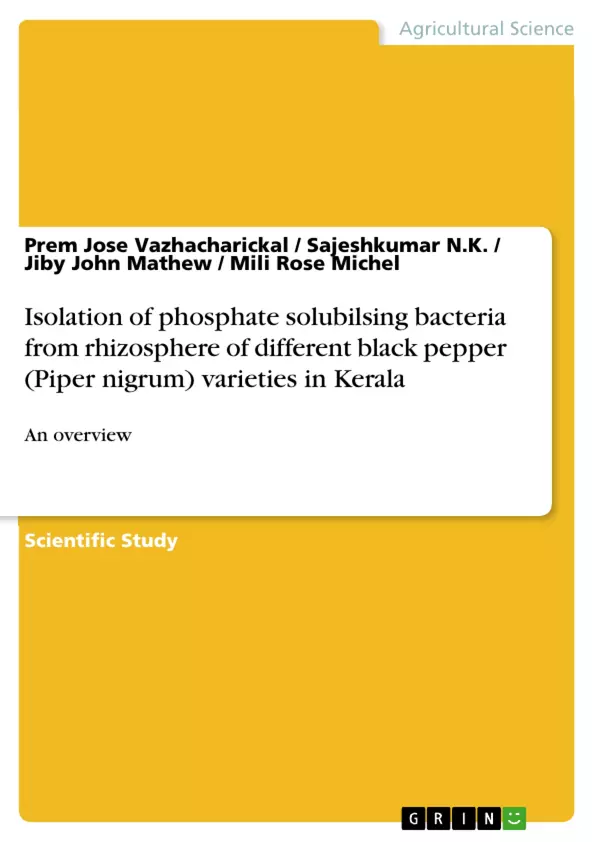Black pepper belongs to piperaceae family and is known as “king of species”. This piperaceae family contain approximately 2,000 species. Phosphorus is one of the most important micronutrients and they are essential for the biological growth, development of plants and it is the most essential nutrient for plants.
Phosphate deficiency is wide spread and phosphate fertilizers universally required in the form of inorganic P fertilizers, only a small portion is utilized by plants and the remaining are in insoluble form and they are solubilised by the microbes present in the soil. Soil, they are rich in micro and macronutrients and sixteen elements or nutrients are essential for plant growth and reproduction. Several soil bacteria, particularly belonging to the genera Pseudomonas and Bacillus posses ability to bring insoluble soil phosphate into soluble forms by secreting acids like formic, lactic and acetic. The rhizosphere soil sample were serially diluted up to 10-4 using sterile distilled water and plated on Pikovskaya’s agar medium by pour plate method. The P solubilising isolates was evaluated on agar plates of Pikovaskya growth medium by solubilising the tricalcium phosphate of the medium.
After incubation the phosphate solubilising microorganisms were selected based on different colonies. Out of so many bacterial isolates, 8 isolates were selected for the further study to perform qualitative and quantitative analysis. Phosphate solubilising microorganisms are possible to use as bio fertilizer for all crops. Among the isolates some of are almost identical in biochemical test but they have different morphology characters.
Inhaltsverzeichnis (Table of Contents)
- Abstract.
- 1. Introduction
- 1.1 Objectives....
- 1.2 Scope of the study.
- 1.3 Taxonomical classification
- 2. Review of literature.......
- 3. Hypothesis
- 4. Materials and Methods
- 4.1 Study area..\li>
- 4.2 Sample collection and processing….......
- 4.3 Isolation of phosphate solubilisation bacteria
- 4.4 Screening of isolates for PSE (plate assay method).
- 4.5 Identification of phosphate solubilisation bacteria ......
- 4.6 Antimicrobial assay
- 4.7 Soil analysis
- 4.8 Statistical analysis.......
- 5. Results and discussion..........\li>
- 5.1 Isolation and population dynamics of PSB.
- 5.2 Morphological and biochemical characteristics
- 6. Conclusions...........
- Acknowledgements .
- References..
Zielsetzung und Themenschwerpunkte (Objectives and Key Themes)
This research project focuses on the isolation and characterization of phosphate solubilizing bacteria (PSB) from the rhizosphere of various black pepper (Piper nigrum) varieties in Kerala, India. The main objective is to identify and characterize these bacteria that can potentially enhance the availability of phosphorus in the soil for black pepper cultivation. This study aims to provide a comprehensive overview of the PSB population dynamics and their potential for improving soil fertility and black pepper yields.
- Isolation and Characterization of Phosphate Solubilizing Bacteria (PSB) from the Rhizosphere of Black Pepper.
- Analysis of PSB Population Dynamics in Different Black Pepper Varieties.
- Determination of the Potential of PSB for Enhanced Phosphorus Availability in Soil.
- Investigation of the Morphological and Biochemical Characteristics of PSB Isolates.
- Assessment of the Antibacterial Activity of PSB Isolates.
Zusammenfassung der Kapitel (Chapter Summaries)
The study begins with a detailed introduction to the importance of phosphate solubilizing bacteria in soil fertility and their application in agriculture, particularly for black pepper cultivation. The introduction also includes a brief overview of the objectives and scope of the research project. The review of literature provides a comprehensive overview of previous research on PSB, including their role in phosphorus solubilization, their characteristics, and their application in agriculture. The materials and methods section details the experimental procedures involved in the study, including sample collection, isolation techniques, screening methods, and identification techniques used to characterize the PSB isolates. The results and discussion section presents the findings of the research, including the isolation and characterization of PSB isolates from different black pepper varieties, their population dynamics, and their potential for phosphorus solubilization. The chapter also discusses the morphological and biochemical characteristics of the PSB isolates, as well as their antibacterial activity.
Schlüsselwörter (Keywords)
The study primarily focuses on phosphate solubilizing bacteria, black pepper, rhizosphere, soil fertility, phosphorus availability, population dynamics, morphological characteristics, biochemical characteristics, and antimicrobial activity. The research investigates the potential of PSB isolates to enhance soil fertility and promote the growth and yield of black pepper plants in Kerala, India.
- Quote paper
- Dr. Prem Jose Vazhacharickal (Author), Sajeshkumar N.K. (Author), Jiby John Mathew (Author), Mili Rose Michel (Author), 2017, Isolation of phosphate solubilsing bacteria from rhizosphere of different black pepper (Piper nigrum) varieties in Kerala, Munich, GRIN Verlag, https://www.hausarbeiten.de/document/370222


